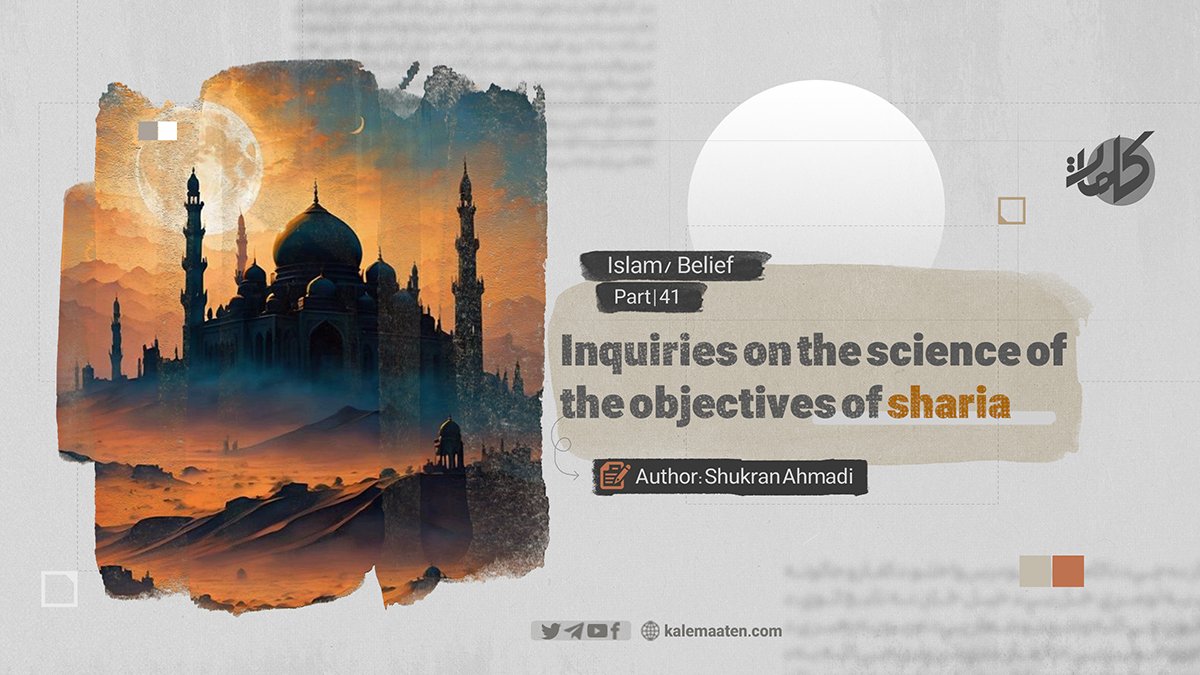Author: Shukran Ahmadi
Inquiries on the Science of the Objectives of Sharia (Part 41)
B: Means of Maintaining the Intellect
2. The Obligation of Education
One of the most important means of maintaining the intellect is education and knowledge, which distinguishes between the wise and the ignorant. Allah Almighty says in the Holy Quran: «قُلْ هَلْ يَسْتَوِي الْأَعْمَى وَالْبَصِيرُ أَمْ هَلْ تَسْتَوِي الظُّلُمَاتُ وَالنُّورُ.» Translation: “(O Muhammad! to the polytheists) say: Are the blind (who are you) and the seeing (who are believers) equal? Or are the darkness (which is your blind questions) and the light (which is the guidance of Allah and the gift of the believers) equal?”
Knowledge not only frees man from ignorance and superstition but also increases his intellectual powers. Allah clearly emphasizes in the Holy Quran: «يرْفَعِ اللَّهُ الَّذِينَ آمَنُوا مِنْكُمْ وَالَّذِينَ أُوتُوا الْعِلْمَ دَرَجَاتٍ.» Translation: “Allah will raise those of you who believe and those who are given knowledge in high ranks.”
Therefore, acquiring knowledge has been prescribed in Islam so that people can strengthen their intellect and stay away from the path of ignorance and misguidance.
3. Prohibition of Spiritual Corruptors
In addition to prohibiting intoxicants and narcotics, Islamic law has declared as forbidden anything that leads the human intellect astray and corrupts it. Among these are vulgar and immoral music, images, and films—things that corrupt the heart and occupy the intellect. Undoubtedly, the effect of these corruptors on the human soul and intellect is no less harmful than the destructive effects of wine.
Conclusion
The importance of self-preservation in Islam is so great that the intentional killing of a Muslim is considered an unforgivable sin, and the perpetrator is destined to spend eternity in hell. To achieve this goal, Islam has proposed numerous positive and negative solutions. The prohibition of self-murder and its criminalization, as well as the legislation of the Qisas (retaliation) law, are among these measures.
Islam has considered human blood to be very valuable in order to protect human lives, so that the unjust killing of one human being is considered equal to the killing of all humanity.
In addition, preserving the intellect is also one of the requirements of the Sharia. Intellect is the factor that distinguishes humans from other creatures and is the means through which Allah is known and worshipped. Moreover, humans can distinguish good from evil through intellect. Based on this understanding, several rulings have been established in Islamic Sharia, the purpose of which is to protect the intellect.
Continues…
References
1. Holy Quran.
2. Al-Bukhari, Muhammad bin Ismail Abu Abdullah (1987). Sahih Al-Bukhari, scholar: Dr. Mustafa Deeb Al Bagha, Beirut, Dar Ibn Kathir.
3. Ibn Ashour al-Tunisi, Muhammad al-Tahir bin Muhammad bin Muhammad al-Tahir (2004). The Purposes of the Islamic Law, researcher: Muhammad al-Habib Ibn al-Khuja, Ministry of Endowments and Islamic Affairs, Qatar.
4. Al-Risoni, Ahmed (1992). The Theory of Objectives by Imam Al-Shatabi, Al-Dar Al-Amani for the Islamic Book.
5. Al-Razi, Ahmad bin Faris bin Zakaria al-Qazwin, Abu al-Hussein (1979). Mujjam Qaayys al-Lugha, Mohaghegh, Abdussalam, Mohammad Haroun, Beirut, Dar al-Fikr.
6. Al-Shatabi, Ibrahim bin Musa bin Muhammad al-Lakhmi Al-Gharnati. Al-Muwafaqat fi Asul al-Sharia, scholar: Abu Ubaidah Mashoor bin Hasan al-Salman, Dar Ibn Affan.
7. Al-Qashiri, Abul-Hossein Muslim bin Al-Hajjaj Al-Nisaburi (133 AH). Sahih Muslim, Lebanon, Beirut, Dar Al-Jil.
8. Al-Youbi, Muhammad Saad bin Ahmad bin Masoud. The Purposes of the Islamic Law and its Interests in the Evidence of the Law, Riyadh, Dar Al-Hajr for Publishing and Distribution.
9. Zarakshi, Badr al-Din, Muhammad bin Bahadur. Al-Bahr al-Muhit fi Asul al-Fiqh, Dar al-Katb Al-Elamiya, Beirut, Lebanon.
10. Ghazali, Abu Hamid, Muhammad bin Muhammad, Al-Mustasafi fi Ilm al-Usul, Beirut, Al-Risala Institute.
11. Ibn Qayyim Juziyya, Muhammad Ibn Abi Bakr. Shafa’ Al-Alil in the Matters of Judiciary, Judgment, Wisdom, and Interpretation, Dar Al-Marafa, Beirut, Lebanon.
12. Amadi, Abul Hasan Seyed al-Din, Ali bin Abi, Ali bin Muhammad. Ghaya Al-Maram, publisher: Majlis al-Ali Lalshaun al-Islamiya.
13. Fakhr al-Din al-Razi, Abu Abdullah, Muhammad bin Umar al-Razi. Mafatih al-Ghayb = Al-Tafsir al-Kabeer, Al-Risalah Foundation.
14. Ibn Hazm, Abu Muhammad Ali Ibn Hazm Andalsi Zahiri. Al-Ahkam fi Asul Al-Ahkam, Beirut, Dar Al-Jail.
15. Ibn Qayyim Juziyya, Muhammad Ibn Abi Bakr. Miftah Dar Al-Saada and Manshur Wilayat Alam Walarada, Cairo, Dar Al Hadith.
16. Mohammad Mostafa Zaheili (2006). Al-Awjiz fi Usul Fiqh al-Islami, Damascus, Dar al-Khair for Printing and Publishing and Distribution.
17. Abu Dawud, Suleiman bin Al-Ashaath Al-Sajestani. Sunan Abi Dawud, Beirut, Lebanon, Al-Maktaba al-Asriya, Saida.
18. Al-Najdi, Sami. The Importance of Objectives of Sharia, Dar Al-Katb Al-Elamiya, Beirut, Lebanon.
19. Muhammad bin Ahmed, Abu Abdullah al-Qurtubi (1962). Tafsir al-Qurtubi, research: Ahmed al-Barduni and Ibrahim Atifish. Cairo, Dar al-Ketub al-Massariya.



